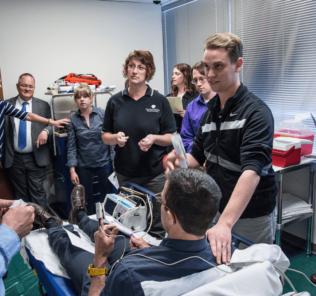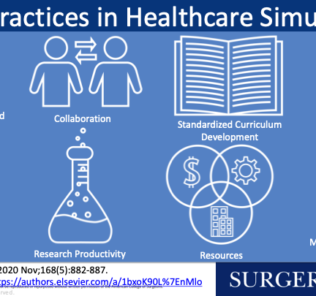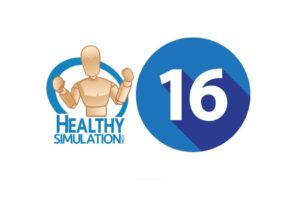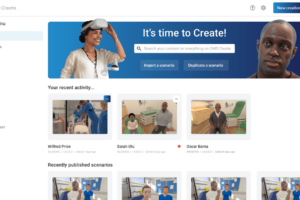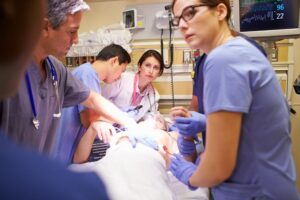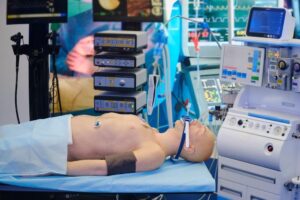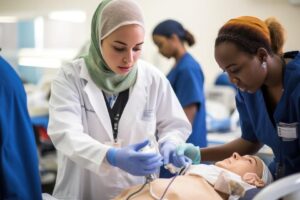Searching for a Healthcare Simulation Fellowship? Consider These Programs!
Healthcare simulation-specific fellowship topics explored may include the development of a solid foundation in simulation-based interventions for education, clinician resilience, and patient safety. Participants may be tasked with analyzing and participating in scenarios focused on interprofessional communication and collaboration as well. Further, there is often the opportunity to receive real-time feedback to improve and refine the fellow’s debriefing skills and to connect with simulation leaders, educators, and quality champions in our worldwide community of practice.
Overall, a healthcare simulation fellowship can help prepare a learner to be an expert in the field of medical simulation. The goal is to help develop the clinical simulation leaders of tomorrow who are capable of advancing the field of medical simulation to new heights. If you know someone involved in healthcare simulation education or learning, we encourage you to share this page with them so that they may consider a medical simulation fellowship as a means to enhance their pursuits. Here is a list of current healthcare simulation fellowships available throughout the world:
- Winter Institute for Simulation, Education & Research- WISER (Pittsburgh, PA)
- The Center for Safety, Simulation and Advanced Learning Technologies Fellowships (Florida)
- Kaweah Delta Clinical Teaching & Simulation Fellowship (Visalia, California)
- Tampa VA Advanced Fellowship in Clinical Simulation (Tampa)
- Patient Safety Movement Foundation Healthcare Safety Fellowship (Remote)
- Akron City Hospital/Summa Health Medical Simulation Fellowship (Akron)
- Cincinnati Children’s Hospital Medical Center Medical Simulation Fellowship (Avondale)
- The University of Alabama at Birmingham UAB Simulation Fellowship (Birmingham)
- Brigham & Women’s Hospital Fellowship in Medical Simulation (Boston)
- Center for Medical Simulation (CMS) Center for Medical Simulation (CMS) Simulation Fellowship (Boston)
- Massachusetts General Hospital Medical Simulation Fellowship (Boston)
- STRATUS Center for Medical Simulation International Fellowship in Medical Simulation (Boston)
- STRATUS Center for Medical Simulation at Brigham and Women’s Hospital Academic Fellowship in Simulation Education (Boston)
- Maimonides Medical Center Clinical Simulation Fellowship (Brooklyn)
- University of Virginia Medical Simulation Education Fellowship (Charlottesville)
- Palmetto Health Simulation Medicine and Faculty Development Fellowship (Columbia)
- OhioHealth Learning OhioHealth Simulation Fellowship (Columbus)
- East Carolina University Brody School of Medicine Emergency Medicine Simulation Fellowship (Greenville)
- Hartford Hospital Simulation Education Fellowship (Hartford)
- Penn State Health Milton S. Hershey Medical Center Simulation Education and Research Fellowship (Hershey)
- Simtiki Simulation Center, John A Burns School of Medicine SimTiki International Scholar Simulation Fellowship (Honolulu)
- The University of California Irvine, School of Medicine Medical Simulation Education Fellowship (Including International) (Irvine)
- Western Michigan University Stryker School of Medicine Medical Simulation Fellowship (Kalamazoo)
- Northwell Health Northwell Health Emergency Medicine Service Line Fellowship in Health Professions Simulation-based Education (Manhasset)
- Hennepin County Medical Center Interdisciplinary Simulation & Education Center (ISEC) Simulation / Medical Education Fellowship (Minneapolis)
- Vanderbilt University Vanderbilt Emergency Medicine Simulation Fellowship (Nashville)
- Cleveland Clinic Sim Center Medical Simulation Fellowship (Cleveland)
- Yale Center for Medical Simulation Yale Center for Medical Simulation Fellowship (New Haven)
- Mount Sinai Hospital Medical Education and Simulation Fellowship (New York)
- The University of California Irvine – Department of Emergency Medicine Emergency Medicine Simulation Fellowship (Orange)
- University of Ottawa DIME/uOSSC Fellowship in Medical Education Research/Fellowship in Medical Education Research and Simulation (Ottawa)
- Jump Simulation Healthcare Simulation Fellowship (Peoria)
- Drexel University Drexel University Simulation Fellowship (Philadelphia)
- Children’s Hospital of Philadelphia, Uni. of Penn Perelman School of Medicine International Simulation Fellowship Program (Philadelphia)
- Mayo Clinic Arizona Mayo Clinic Military Simulation Fellowship (Phoenix)
- VA Pittsburgh Healthcare System Advanced Interprofessional Fellowship in Clinical Simulation (Pittsburgh)
- Brown University Medical Simulation Fellowship at Lifespan Medical Simulation Center (Scroll & click on “Simulation” (Providence)
- Mayo Clinic Multidisciplinary Simulation Center Mayo Clinic Multidisciplinary Simulation Center Simulation Fellowship (Rochester)
- University of Arizona University of Arizona Medical Simulation Fellowship (Tucson)
WISER’s Healthcare Simulation Fellowship
Sponsored Content:
The Winter Institute for Simulation Education and Research (WISER) was one of the first simulation centers to receive accreditation from the Society for Simulation in Healthcare (SSH) for a fellowship program. WISER’s healthcare simulation fellowship program was formalized in 2009 and has evolved dramatically since its inception. The program accepts simulationists from all over the world and has a network of previous Fellows spanning 10 countries and three continents. Here we take a closer look at the opportunity for those seeking a very high level of training in the discipline of medical simulation.
The WISER Fellowship program is designed for learners that would like to participate in a one-year or two-year curriculum that includes the WISER Foundation courses, electives, workshops, course observations, and a scholarly project. WISER provides support with project conceptualization and completion during the Fellowship. Projects often include research, curriculum development, or a combination of topics. By working closely with WISER’s experts, program participants can integrate into WISER’s network of simulation education experts.
The Fellowship has established numerous teaching and learning processes to allow Fellows to advance their usage of healthcare simulation. The goal is that through these processes, learners gain the general understanding and practical skills needed to prevent medical errors and improve patient safety. Other objectives of the WISER Fellowship include enhancing clinical simulation education programs, engaging in mentorship, understanding systems design, and conducting meaningful healthcare simulation research.
More About Fellowships
Sponsored Content:
One primary advantage of a fellowship is the ability to encounter unique experiences that are not typically available to someone in school or who are just starting out in an entry-level position. Typically these short-term opportunities and fellowships can last anywhere from a few weeks to a few months, and in some cases upwards of a year. They are normally sponsored by an organization, institution, association, or government agency, and eligibility requirements are thereby set by the respective sponsor. A possible applicant qualification could include a record of achievement in healthcare education, as provided by letters of reference, publications, teaching evaluations, or prior specialized training or experience in medical education.
Also depending on the fellowship sponsor, there may exist the opportunity to acquire nationally competitive grants, scholarships, and other funding opportunities. Today, many fellowship sponsors also present two means of enrollment: either in-person or online. The duration of a fellowship may be impacted by whether the program is online or in-person.
Regardless of the length of the fellowship and the sponsor, there are many possible benefits of enrolling in such a program. For example, learners who enter a fellowship are faced with opportunities that extend beyond the scope of standard academic learning. They can be immersed in new cultural experiences, access to academic seminars, vastly expand their professional network, face experiential learning scenarios, and reach new professional development milestones. Note, that experiential learning varies depending on the fellowship program.
Learn More About Healthcare Simulation Fellowships
Lance Baily, BA, EMT-B, is the Founder & CEO of HealthySimulation.com, which he started while serving as the Director of the Nevada System of Higher Education’s Clinical Simulation Center of Las Vegas back in 2010. Lance is also the Founder and acting Advisor to the Board of SimGHOSTS.org, the world’s only non-profit organization dedicated to supporting professionals operating healthcare simulation technologies. His co-edited Book: “Comprehensive Healthcare Simulation: Operations, Technology, and Innovative Practice” is cited as a key source for professional certification in the industry. Lance’s background also includes serving as a Simulation Technology Specialist for the LA Community College District, EMS fire fighting, Hollywood movie production, rescue diving, and global travel. He and his wife Abigail Baily, PhD live in Las Vegas, Nevada with their two amazing daughters.
Sponsored Content:





